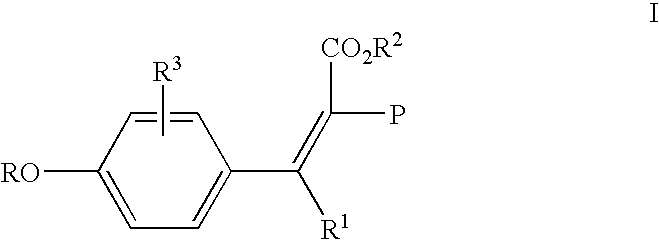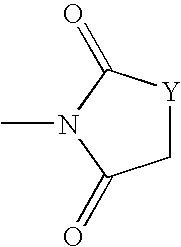Addition of UV inhibitors to pet process for maximum yield
- Summary
- Abstract
- Description
- Claims
- Application Information
AI Technical Summary
Benefits of technology
Problems solved by technology
Method used
Image
Examples
example
Dimethyl terephthalate (“DMT”), ethylene glycol (“EG”), 1,4-cyclohexanedimethanol (“CHDM”) 65 ppm zinc acetate, 230 ppm antimony trioxide, 70 ppm phosphoric acid, are introduced into the first reaction chamber of a multi-chamber polycondensation reactor at a pressure of about 48 psi. The DMT is fed into the first reaction chamber at a rate of 180 lb / min, the EG is fed into the first reaction chamber at a rate of about 130 lb / min EG, and the CHDM is fed into the first reaction chamber at a rate of about 2.2 lb / min. The zinc acetate is present in an amount of about 65 ppm zinc atoms, antimony trioxide is present in an amount of about 230 ppm antimony atoms, and the phosphoric acid is present in an amount of about 70 ppm phosphorus atoms (the amounts of these ingredients are determined by measuring the amount of metal atom present.) The polymerization product is transported from reactor to reactor with the reaction pressure decreasing in each subsequent reactor chamber. The temperatur...
PUM
| Property | Measurement | Unit |
|---|---|---|
| Fraction | aaaaa | aaaaa |
| Fraction | aaaaa | aaaaa |
| Fraction | aaaaa | aaaaa |
Abstract
Description
Claims
Application Information
 Login to View More
Login to View More - R&D
- Intellectual Property
- Life Sciences
- Materials
- Tech Scout
- Unparalleled Data Quality
- Higher Quality Content
- 60% Fewer Hallucinations
Browse by: Latest US Patents, China's latest patents, Technical Efficacy Thesaurus, Application Domain, Technology Topic, Popular Technical Reports.
© 2025 PatSnap. All rights reserved.Legal|Privacy policy|Modern Slavery Act Transparency Statement|Sitemap|About US| Contact US: help@patsnap.com



